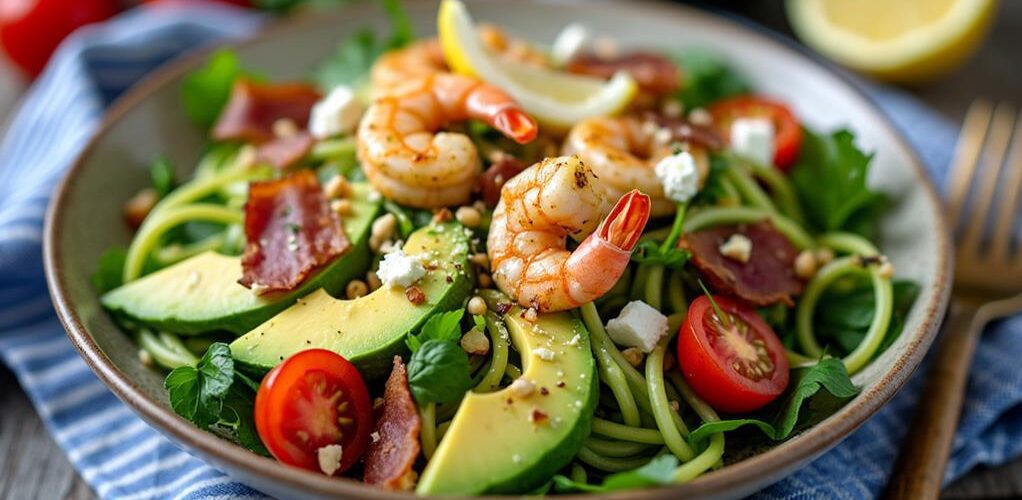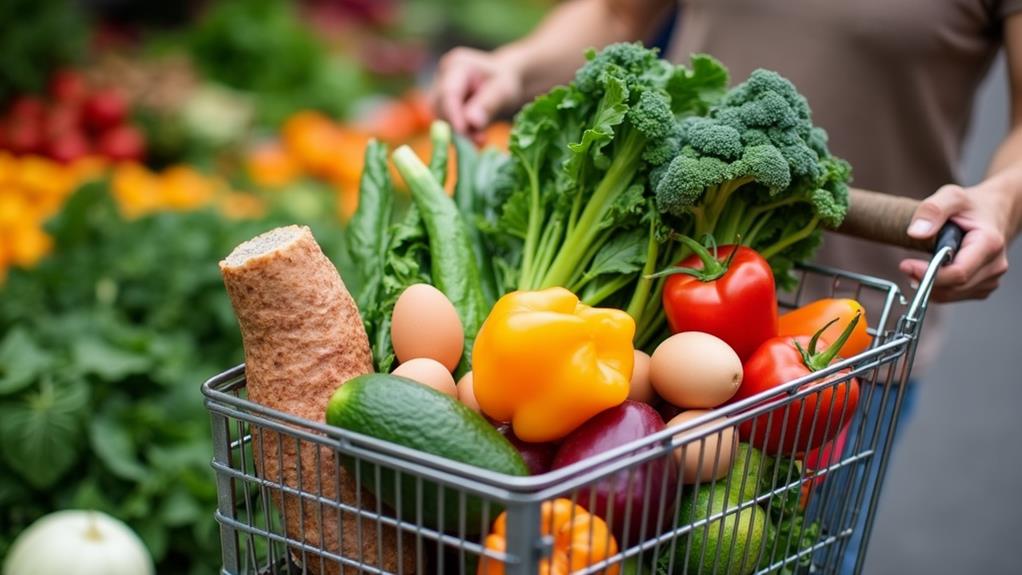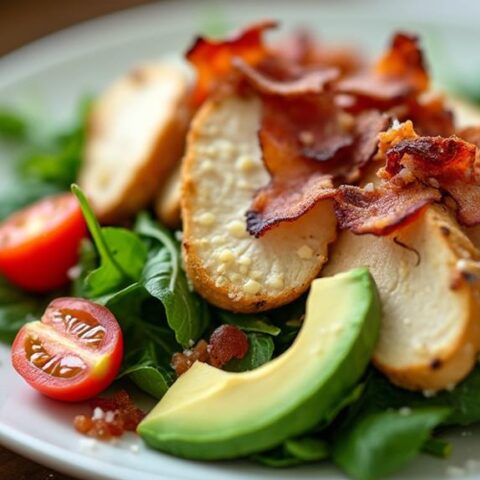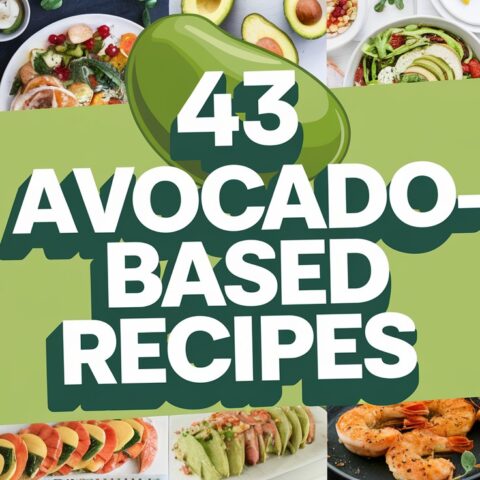
The cost of a keto diet typically ranges from $50 to $75 per week, largely influenced by ingredient choice and meal preparation tactics. Budget-friendly protein sources such as eggs, ground meats, and canned fish are economical, as are healthy fats like avocados and bulk shredded coconut. Non-starchy vegetables and seasonal produce are cost-efficient and nutrient-dense. Homemade keto meals, compared to dining out, reduce expenditures while giving control over nutritional intake. By planning meals and buying in bulk, individuals can manage the cost effectively while ensuring nutritional needs are met. Explore further strategies to optimize your keto diet expenses.
Key Takeaways
- Homemade keto meals cost between $150 to $300 per person monthly.
- Popular keto recipes range from $0.70 to $1.83 per serving.
- Budget-friendly keto ingredients include eggs, ground meats, and canned fish.
- Buying in bulk reduces costs for staples like almond flour and oils.
- Seasonal produce and frozen vegetables offer lower-cost, nutrient-dense options.
Cost Breakdown of Popular Keto Recipes
Understanding the cost breakdown of popular keto recipes is essential for maintaining both a healthy diet and a balanced budget. Keto recipe comparisons reveal significant variations in costs, making it possible to strategically choose meals that align with financial constraints while still meeting nutritional needs.
Focusing on affordable keto foods, such as eggs and ground meats, can further enhance cost-efficiency.
For instance, the Buffalo Chicken Jalapeno Popper Casserole is a flavorful option priced at $9.33, or $1.56 per serving. However, a more economical alternative is the Low Carb Pepperoni Pizza, which costs $5.33 in total, reducing the expense to just $0.89 per serving. This illustrates that classic comfort foods can be adapted to fit a keto diet without breaking the bank.
Desserts also offer opportunities for cost saving techniques. The Keto Chocolate Cake in a Mug, at $1.20 per serving, is an affordable way to satisfy sweet cravings.
On the savory side, the Bacon and Roasted Garlic Spinach Dip totals $5.92 for 6 servings, equating to $0.99 per serving, making it a budget-friendly snack.
Additionally, the Maple Pecan Fat Bomb Bars present a cost-effective option for keto dieters, with a total cost of $9.78 for 12 servings, or $0.82 per serving.
These comparisons highlight how careful selection of recipes can optimize both nutrition and expenditure.
Budget-Friendly Keto Ingredients
When managing a keto diet on a budget, focusing on affordable protein sources like eggs at approximately $4.25 per dozen and versatile ground meat can be highly economical.
Additionally, incorporating nutrient-dense canned fish and cost-effective frozen vegetables guarantees balanced nutrition without breaking the bank.
To further enhance your diet, consider adding healthy fats such as avocados and olive oil, which can be found at reasonable prices in bulk.
Bulk purchasing staples such as almond flour and nuts can further reduce costs, making it feasible to maintain a nutrient-rich keto lifestyle.
Affordable Protein Sources
A critical aspect of maintaining a ketogenic diet on a budget is identifying affordable protein sources that align with keto-friendly macros.
Egg nutrition, for instance, is exemplary; at an average of $4.25 per dozen, each large egg delivers 6.3 grams of protein and 4.8 grams of fat, making them a cost-effective and nutrient-dense option.
Diversifying protein sources is vital for nutritional balance and cost management. Ground meats, such as beef or turkey, are versatile and typically less expensive than other cuts, providing substantial protein without straining the budget.
Canned fish, like tuna or salmon, offers a shelf-stable, omega-3-rich alternative to fresh fish, often at a fraction of the cost. These options guarantee a variety of nutrients while keeping expenses in check.
Whole chickens are another budget-friendly protein source; purchasing them whole rather than pre-cut can substantially lower the cost per pound, providing more meat for less money.
Incorporating these protein variety options into a ketogenic diet not only supports nutritional needs but also helps in maintaining the diet sustainably.
Cost-effective choices such as these are essential for those seeking to adhere to a ketogenic lifestyle without excessive financial burden.
Economical Healthy Fats
Economizing on healthy fats is essential to maintaining a ketogenic diet without financial strain. Identifying budget-friendly healthy fat sources allows individuals to adhere to their dietary goals without compromising on nutrition. Here are several economical options to take into account:
- Cooking Oil Options: Canola and vegetable oils are exceptionally affordable, costing roughly $0.10 per ounce when bought in bulk. These oils provide essential fats and are versatile for various culinary uses, making them staple items in a cost-efficient keto kitchen.
- Avocados: At around $1 each, avocados are an excellent source of monounsaturated fats. They not only add creaminess to meals but also deliver important nutrients like potassium and fiber, which are necessary for maintaining overall health on a keto diet.
- Bulk Shredded Coconut: Priced at approximately $4.00 for a 3 lb bag, shredded coconut offers a nutritious and economical fat source. It can be incorporated into numerous recipes, from keto desserts to savory dishes, ensuring a diverse and satisfying diet.
Additionally, peanut butter and olive oil serve as valuable inclusions.
Peanut butter, affordably priced at about $2.50 for a 28 oz jar, provides both fats and proteins.
Olive oil, while sometimes more expensive, can be obtained at wholesale prices, offering a high-quality fat source for cooking and dressings.
Cost-effective Vegetables
Incorporating cost-effective vegetables into a ketogenic diet is a strategic approach to maintain nutritional balance without exceeding budget constraints. Non-starchy vegetable varieties such as zucchini, broccoli, cauliflower, and spinach are typically more affordable, often costing less than $1 per serving. These vegetables are rich in essential nutrients while being low in carbohydrates, making them ideal for a keto regimen.
Frozen vegetables offer a cost-effective alternative to fresh produce. They are generally less expensive, have a longer shelf life, and retain their nutritional value, providing a practical option for those aiming to minimize food waste.
Additionally, opting for seasonal produce can notably reduce costs. Seasonal vegetables are usually cheaper and fresher, and shopping at local farmers' markets can yield both lower prices and superior quality.
Purchasing whole vegetables rather than pre-cut or packaged options can lead to substantial savings, as bulk produce is more economical. Vegetables like cabbage and bell peppers are low in carbs and high in volume, making them excellent choices to enhance meals without considerably increasing costs.
Meal Preparation Strategies

Implementing weekly meal planning and efficient batch cooking can greatly reduce the cost associated with maintaining a keto diet.
By strategically planning meals and utilizing leftovers, individuals can minimize food waste and avoid impulse purchases that contribute to higher grocery bills.
Employing mise en place can further streamline cooking processes, saving time and enhancing efficiency.
These meal preparation strategies also guarantee that nutrient-dense, keto-friendly ingredients are consistently available, helping to maintain dietary adherence while optimizing financial resources.
Weekly Meal Planning
How can strategic meal planning transform your keto diet experience both nutritionally and financially? By integrating meal prep into your routine, you can greatly cut costs while guaranteeing nutrient-rich meals. Here's how:
- Reduced Food Waste: The average household wastes about $1,500 annually on uneaten food. Meal planning minimizes this by aligning your grocery list with your planned menu, guaranteeing you only buy what you need.
- Grocery Savings: A well-thought-out shopping list prevents impulse buys and helps you take advantage of sales and bulk purchasing. This not only keeps you within your budget but also guarantees you have all necessary keto ingredients without overspending.
- Seasonal Produce: Planning meals around seasonal produce can enhance your nutrition and offer considerable savings. Seasonal items are often fresher and more affordable, making this a cost-effective strategy for your keto diet.
Incorporating these strategies into your weekly routine can maximize grocery savings and guarantee a balanced, nutrient-rich diet.
Efficient Batch Cooking
Efficient batch cooking, a cornerstone of effective meal preparation strategies, offers a multifaceted approach to optimizing both time and resources within a keto diet framework. By preparing multiple servings at once, individuals can greatly reduce cooking time throughout the week, thereby minimizing the need for daily meal prep. This method not only saves time but also maximizes resource utilization by allowing for the efficient use of leftovers, which reduces food waste and expenditure.
Keto meal prep benefits further from proper planning and organization, ensuring a diverse range of meals that prevent dietary monotony and enhance adherence to the keto lifestyle. Through strategic batch cooking, individuals can streamline grocery shopping, creating precise weekly shopping lists based on planned recipes. This approach maximizes savings and time efficiency by focusing on keto-friendly staples that are cost-effective when bought in bulk.
Additionally, emphasizing nutrient-dense, staple ingredients such as eggs, avocados, and leafy greens can lead to considerable cost savings while maintaining the nutritional integrity of the diet.
Efficient cooking techniques combined with a well-structured meal prep strategy can therefore play an essential role in reducing the overall cost of maintaining a keto diet, making it both sustainable and economical.
Homemade Meals vs. Eating Out
When considering the financial implications of maintaining a keto diet, the distinction between homemade meals and dining out becomes noticeably clear. Preparing homemade keto meals typically incurs considerably lower costs compared to dining out. For instance, a homemade Low Carb Pepperoni Pizza costs approximately $5.33 for the entire recipe, whereas similar restaurant versions can range from $5 to $15 per meal.
The financial benefits of keto meal prep extend beyond individual meals. Additionally, homemade options like Parmesan Chicken can be made quickly and affordably, providing further savings.
- Monthly Savings: The average cost of a full month of homemade keto meals ranges from $150 to $300 per person, allowing for healthier choices at lower prices compared to frequent restaurant visits.
- Nutrient Density: High-fat homemade meals reduce cravings and enhance satiety, leading to less spending overall compared to lower-fat restaurant meals.
- Bulk Purchasing: By focusing on cooking at home, individuals can take advantage of bulk purchasing and sales, further decreasing the cost of their keto diet.
Therefore, prioritizing homemade keto meal prep over dining out not only minimizes expenses but also offers greater control over nutritional content, enabling more strategic management of both budget and diet.
Keto Dessert Options

Although maintaining a keto diet often emphasizes savory dishes, incorporating affordable and nutrient-dense keto dessert options can enhance dietary adherence and satisfaction. Emerging keto dessert trends offer numerous budget-friendly choices that align with the low-carb, high-fat criteria essential to the diet.
One such option is the Keto Chocolate Cake in a Mug, which costs only $1.20 per serving. This quick and easy dessert satisfies sweet cravings without compromising on nutritional goals. Common ingredients in keto desserts, such as almond flour and erythritol, contribute to the low-carb profile while maintaining sweetness.
For breakfast or a sweet snack, the Low Carb Cinnamon Roll Waffle is an innovative choice at just $1.83 per serving, combining convenience with cost-effectiveness. The Keto Chocolate Roll Cake is another exemplary option, delivering a rich dessert experience at only $0.70 per serving, making it both affordable and indulgent.
Maple Pecan Fat Bomb Bars, priced at $0.82 per serving, harness the power of nutrient-dense ingredients to provide a satisfying treat. Creative keto toppings such as sugar-free whipped cream or crushed nuts can further enhance these desserts, adding variety and additional nutrients.
Budget-Friendly Keto Foods
Maintaining a keto diet on a budget is entirely feasible with strategic food choices that maximize nutritional value without breaking the bank. Affordable protein sources are a key component; eggs, averaging $4.25 per dozen, and ground meat are both versatile and cost-effective.
Incorporating frozen vegetables is another savvy choice as they retain their nutritional value while often being less expensive than fresh vegetables. Nonstarchy vegetables like zucchini, broccoli, and cauliflower are not only affordable but also enhance meals with volume and fiber.
For those looking to save even more on staple keto items, buying in bulk can be highly economical. For instance, 3 lb bags of almonds are priced around $13 at wholesale clubs like Costco. This practice also applies to nuts, seeds, and oils, which are essential for keto snack ideas and meal preparation.
Additionally, opting for seasonal fruits and vegetables can further cut costs, with local farmers' markets often offering fresh produce at lower prices compared to traditional grocery stores.
Key Budget-Friendly Keto Foods
- Eggs and Ground Meat: Affordable sources of high-quality protein.
- Frozen and Nonstarchy Vegetables: Cost-effective and nutrient-dense.
- Bulk Purchases: Significant savings on keto staples like nuts and oils.
Tips for Following Keto on a Budget

Adopting a keto lifestyle on a budget necessitates strategic planning and resourcefulness to assure nutritional adequacy without incurring excessive costs. Meal prepping is an effective strategy; it saves both time and money by minimizing food waste and reducing the temptation to buy expensive, last-minute meals.
Preparing keto snacks in advance assures that healthier, budget-friendly options are readily available. Utilizing efficient cooking methods like batch cooking techniques can further streamline the process, enhancing variety and consistency.
Buying in bulk is another essential grocery hack. Staple keto items such as nuts, seeds, and oils can be purchased in larger quantities for a lower price per unit, leading to significant savings.
Additionally, seasonal produce and frozen vegetables offer high nutritional value at a fraction of the cost of out-of-season fresh options, making them excellent choices for a budget-conscious keto diet.
Utilizing coupons and cash-back apps like Ibotta can further reduce grocery bills. These tools can make it easier to stick to a keto diet without overspending.
Frequently Asked Questions
Is a Keto Diet Expensive?
A keto diet can be cost-effective with strategic meal planning. By opting for budget-friendly keto foods like ground meat, eggs, and seasonal vegetables, and utilizing sales, the monthly expense can range from $150 to $300 per person.
How Much Does It Cost for a Keto Diet?
The cost of a keto diet varies, typically ranging from $150 to $300 monthly per person. Effective meal prep and strategic food choices, such as using budget-friendly ingredients or purchasing in bulk, can greatly reduce expenses while ensuring nutrient needs are met.
How Much Does It Cost to Stay on Keto?
To stay on keto, expert keto meal planning and strategic grocery shopping are essential. Monthly costs range from $150 to $300 per person, with daily expenses managed at $5 to $10 by choosing budget-friendly proteins and seasonal produce.
Is It Possible to Do Keto on a Budget?
Yes, it is possible to do keto on a budget. Effective keto meal planning, utilizing cost-effective protein sources, and incorporating budget-friendly snacks like nuts and seasonal produce can make the diet both affordable and nutrient-dense.
Conclusion
In summary, adhering to a ketogenic diet can vary in cost, influenced by choices in ingredients, meal preparation strategies, and dining preferences. Through strategic planning and selection of budget-friendly keto foods, the financial burden can be minimized while still maintaining nutritional adequacy. Emphasizing homemade meals and affordable ingredients guarantees that the diet remains sustainable. Ultimately, the key to an economically viable keto diet lies in informed decision-making and resourceful meal planning.









No Comments